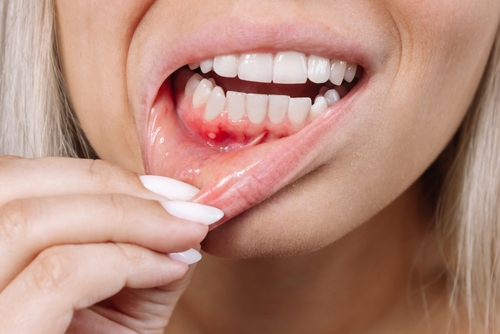Everything You Need to Know About Moderate Periodontitis
Moderate periodontitis is a common stage of gum disease that can lead to significant oral health issues if left untreated. It’s important to recognize the symptoms early on and seek proper treatment to prevent further damage. At Tuckerton Dental, our experienced Tuckerton, NJ dentist, Dr. Ronald Petrosky can explain how moderate periodontitis affects your oral health, and how you can treat and prevent it.
If you’re in Tuckerton, Little Egg Harbor, Barnegat, Manahawkin, Beach Haven or nearby areas, contact Tuckerton Dental today by calling (609) 296-1007.
What Is Moderate Periodontitis?
Periodontitis is a form of gum disease that occurs when the gums and bone supporting the teeth become infected. In its moderate stage, periodontitis means that the infection has progressed past gingivitis (the mildest form of gum disease), affecting the gums and underlying bone more deeply. This stage typically involves a more noticeable breakdown of tissue and bone around the teeth, leading to gum recession, tooth mobility, and other issues that can worsen without timely intervention.
Symptoms of Moderate Periodontal Disease
 Moderate periodontitis often comes with symptoms that are more severe than early gum disease. Common signs to watch for include:
Moderate periodontitis often comes with symptoms that are more severe than early gum disease. Common signs to watch for include:
- Bleeding Gums: Your gums may bleed when brushing or flossing.
- Gum Recession: The gums start to pull away from the teeth, exposing more of the tooth’s surface or even its root.
- Persistent Bad Breath: Chronic bad breath (halitosis) that doesn’t go away with regular oral hygiene.
- Swollen, Tender Gums: Gums may appear red, swollen, and feel tender to the touch.
- Loose Teeth: As the bone supporting the teeth deteriorates, teeth can start to feel loose or shift.
- Increased Pockets Between Gums and Teeth: Periodontitis creates deeper pockets between the teeth and gums, trapping bacteria and debris.
If you notice any of these symptoms, it’s essential to visit Dr. Petrosky at Tuckerton Dental for an evaluation.
Treatment for Moderate Periodontal Disease
Treating moderate periodontitis requires professional care to prevent further progression of the disease. Depending on the severity of your condition, Dr. Petrosky may recommend the following treatments:
Scaling and Root Planing
This deep cleaning procedure removes plaque and tartar from below the gumline, helping to eliminate the bacteria causing infection. Scaling cleans the teeth, while root planing smooths the tooth roots to help the gums reattach and heal.
Antibiotic Therapy
In some cases, antibiotics may be prescribed to control the bacterial infection. These can be taken orally or applied directly to the affected gum pockets.
Laser Therapy
Laser treatment is a minimally invasive option to target and remove infected tissue. It can promote faster healing and help reduce gum pocket depth.
Gum Surgery
If the disease is more advanced or doesn’t respond to less invasive treatments, gum surgery may be necessary. Surgery can help to clean deeper pockets, reshape damaged bone, or even graft new tissue to areas of severe gum recession.
How to Prevent Further Progression
The best way to manage moderate periodontitis and prevent it from worsening is to maintain a strict oral hygiene routine. This includes:
- Brushing Twice Daily: Use a soft-bristled toothbrush and fluoride toothpaste.
- Flossing Daily: Flossing removes plaque and food particles from between the teeth and along the gumline.
- Regular Dental Checkups: Dr. Petrosky can monitor your gum health and catch any issues early on, helping you avoid more invasive treatments later.
- Professional Cleanings: Regular dental cleanings are essential to remove plaque and tartar that daily brushing and flossing may miss.
The Importance of Early Intervention
Catching periodontitis in its early stages is key to avoiding more severe complications. If left untreated, moderate periodontitis can progress into severe periodontitis, potentially leading to tooth loss and extensive damage to the gums and bone. Early intervention with treatments like scaling and root planing, antibiotics, or laser therapy can prevent the need for more extensive procedures down the road.
Frequently Asked Questions
While moderate gum disease can’t be reversed, it can be treated to prevent further damage and tooth loss. Treatment can also ease your symptoms and start you on the journey to healthy gums. Without treatment, it can progress to advanced periodontal disease, leading to further complications.
Yes, moderate periodontitis has been linked to several health problems, including heart disease, diabetes, and stroke.
The best way to prevent moderate gum disease is to maintain good oral hygiene habits such as brushing twice a day, flossing daily, and visiting your dentist regularly for checkups and dental cleanings. It’s also essential to avoid smoking, which can increase the risk of gum disease.
While good oral hygiene habits are crucial for preventing and managing the disease, moderate gum disease requires professional treatment from a dentist. Avoid using home remedies or over-the-counter products without consulting with your dentist first, as they may not be effective and could worsen the condition.
Protect Your Smile from Moderate Periodontitis
Moderate periodontitis is a serious condition that requires timely care to prevent further damage to your teeth and gums. With proper treatment and consistent oral hygiene, you can stop the progression of gum disease and maintain a healthy smile. If you are experiencing symptoms of moderate periodontitis, contact Dr. Petrosky today. His team serves patients in the surrounding areas near Tuckerton, including Little Egg Harbor, Stafford Township, and Barnegat.
Your oral health is important—don’t wait until it’s too late! Schedule a consultation with Dr. Petrosky by calling (609) 296-1007 to take the first step toward healthier gums today.